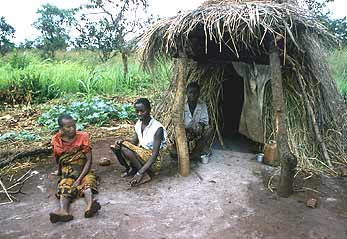Rwandan refugees fear forced returns from Tanzania
Rwandan refugees fear forced returns from Tanzania

MKUGWA, Tanzania, March 10 (UNHCR) - The Rwandan refugee's eyes are bloodshot, his forehead is furrowed with worry-lines and a vein throbs in his temple as he nervously and repeatedly clenches his jaw.
"Just look at me," says Jean-Damascène Ngirinshunti (not his real name), gesturing at his face. "Nowadays I can't sleep. I never fall asleep until 4 am. My wife is trying to comfort me, but I just can't sleep because I am thinking too much. I am very upset."
What has destroyed the 40-year-old former soldier's slumber is the prospect of being forced to go back home to Rwanda - a threat that looms large as refugees believe the Tanzanian government had set a deadline of early March for all remaining Rwandan refugees in the country to return home.
In February, district commissioners in the western areas of Tanzania, where the refugee camps are located, told refugees and some UNHCR officials that all remaining Rwandans had to leave by early March. However, none have yet been expelled, and UNHCR Representative in Tanzania Crysantus Ache says the official position of the government is simply that Rwandan refugees now in the country should be screened individually to determine whether they still qualify for refugee status.
"The rhetoric is there [against the Rwandans] but no Rwandan refugee has been forced out of Tanzania," said Ache.
In 1994, an estimated 1.3 million Rwandans fled civil war and genocide to what was then eastern Zaire (now the Democratic Republic of the Congo, or DRC), while more than half a million escaped to Tanzania. Hundreds of thousands went back to Rwanda from both DRC and Tanzania in 1996.
The Tanzanian government argues that Rwanda is now safe, and Rwandans no longer need protection in this country of asylum. Between October and December last year, more than 23,000 Rwandan refugees left Tanzania in a voluntary repatriation organised by the UN refugee agency. About 2,600 Rwandans remain in Tanzania, and many of them argue they have special circumstances that make it unsafe for them to go back.
Ngirinshunti, who is under UNHCR protection in Mkugwa camp in Western Tanzania, says he is a special case. A former high-ranking official in the Rwandan Patriotic Army (RPA), he says he fled his homeland two years ago after other soldiers were sent to kill him.
His is a complicated tale, involving what he says are false accusations that he leaked military secrets to international media, and reprisals against him for appealing to military commanders to investigate the murder of his nephew by soldiers.
The reasons he is being persecuted are "both personal and ethnic," he says. "I am a Tutsi but they think I am Hutu. I know if I go back to Rwanda I will be vulnerable."
The feeling is shared by other Rwandans who remain in UNHCR camps in Western Tanzania. "I am worried we will be deported," says Bosco N., a 26-year-old Hutu whose father is accused by some Tutsi neighbours back home of failing to protect their Tutsi relatives from being slaughtered during the 1994 genocide in Rwanda.
Now living in Lukole camp in north-western Tanzania, he went home once before, between 1996 and 1998, and that was enough to teach him he can't live in Rwanda, he says. "If I count the number of days I slept in my own home, for the whole time it was not more than 20 days because so many killings were happening in my neighbourhood."
Another 26-year-old Rwandan in Lukole, a son from a mixed marriage, said his entire family - mother, father and three brothers and sisters - were killed in Rwanda by a grenade thrown into their house. Rather than go back, this man says he will try to live illegally in a Tanzanian village or seek refugee status in another country.
UNHCR's Ache argues that the majority of Rwanda refugees who were in the country have been able to return home with no problems. "I was recently in Rwanda and visited recent returnees. The ambience of reconciliation is high," said Ache.
The word evidently has not filtered back to those remaining in Tanzania's refugee camps. In Mkugwa, Vianney N., a 39-year-old Hutu man with four children under his care, who says his wife was murdered by RPF soldiers, feels he can't go home. Referring to the 1994 genocide in Rwanda, he says, "What was before and what is now are the same situation."
He appeals for the Tanzanian government to listen to the refugees: "Listen to the individual cases before making a decision to force them to go back."
As for former army official Ngirinshunti, he is determined to resist any efforts to force him back to Rwanda. "If they want to take me by force, I will lie down and let them shoot me, but I will not go back," he says vehemently.
By Kitty McKinsey
UNHCR Regional Office in Nairobi, Kenya









